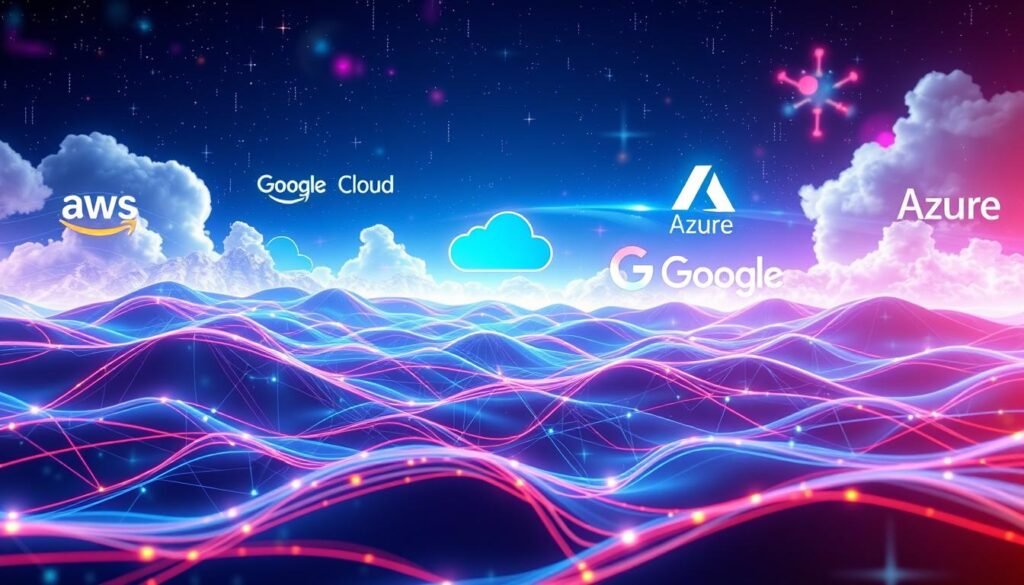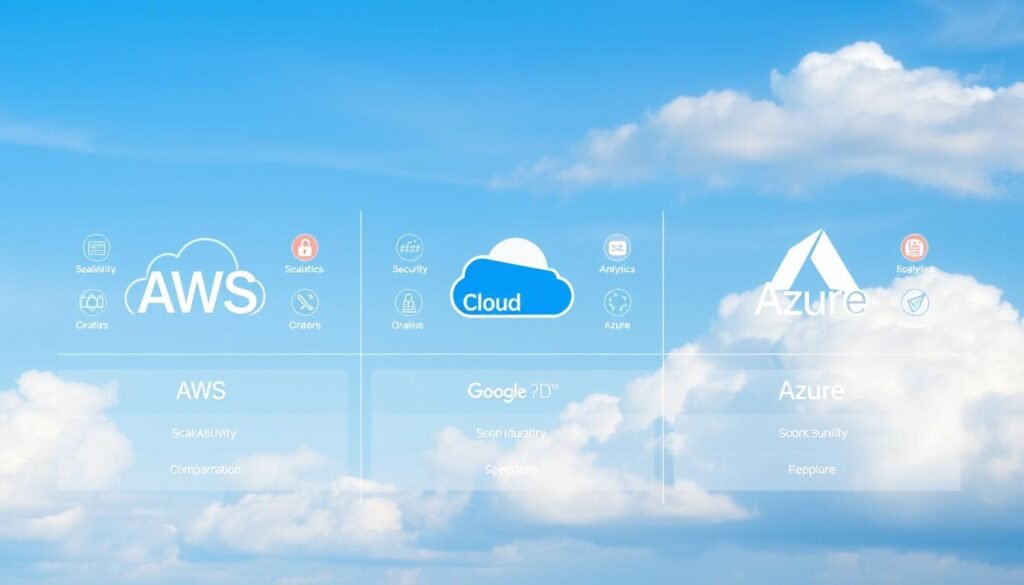Did you know that just three cloud service providers dominate 64% of the global cloud market? Amazon Web Services (AWS), Microsoft Azure, and Google Cloud Platform (GCP) have changed how businesses handle digital infrastructure. They offer unmatched scalability and flexibility for companies all over the world.
In the fast-changing world of cloud computing, knowing the differences between these public cloud services is key. This detailed comparison will explore the strengths, abilities, and special features of AWS, Azure, and Google Cloud.
If you’re a startup aiming to improve your tech setup or an enterprise looking for strong cloud solutions, understanding cloud service providers is essential. Our guide will provide you with the insights you need. We’ll look at important aspects of these cloud computing platforms.
Key Takeaways
- AWS leads the market with 34% global cloud market share
- Each cloud provider offers 200+ unique services
- Multi-cloud strategies are increasingly popular
- Pricing models vary significantly between providers
- Enterprise adoption rates differ across platforms
- Geographic coverage is a critical selection factor
Understanding the Big Three Cloud Providers
Cloud computing has changed the digital world. Amazon Web Services (AWS), Microsoft Azure, and Google Cloud Platform (GCP) lead the market. They have changed how businesses use technology.
Market Share and Industry Position
The cloud computing market shows a clear order:
- AWS leads with about 33% market share
- Microsoft Azure has 21% of the market
- Google Cloud Platform has 11% of the market
Evolution of Cloud Computing Services
Each provider started from a different background:
- AWS: Started in 2004, first with infrastructure as a service (IaaS)
- Microsoft Azure: Introduced in 2008, using its enterprise software knowledge
- Google Cloud: Joined the public cloud market in April 2008
Key Features Overview
Looking at platform as a service, each provider has unique strengths:
- AWS: Famous for reliability and wide service range
- Azure: Excels in hybrid cloud solutions
- Google Cloud: Ahead in artificial intelligence and data analytics
“Cloud computing is not just a technology, it’s a fundamental shift in how businesses consume and manage IT resources.” – Cloud Industry Expert
Knowing these cloud providers helps businesses choose the right digital strategy.
Cloud Platform Comparison: AWS Google Cloud Azure services comparison
Choosing the right cloud computing services can be tough. Many cloud providers are vying for your attention. Each big three has unique strengths for different business needs.
Compute and Container Services
- AWS offers EC2 instances with extensive scaling capabilities
- Google Cloud provides Kubernetes Engine with multi-cloud support
- Azure delivers robust container orchestration through Azure Kubernetes Service
Artificial Intelligence and Machine Learning
The cloud platforms for AI show big differences:
- Google Cloud’s Vertex AI supports large-scale predictive model training
- AWS SageMaker provides extensive machine learning tools
- Azure AI Platform offers seamless integration with Microsoft ecosystem
“Your cloud strategy should align with your specific technological requirements and business goals.” – Cloud Computing Expert
Networking and Distributed Solutions
Each provider has unique networking capabilities:
| Provider | Networking Capability |
|---|---|
| Google Cloud | Cloud Router with BGP dynamic route exchange |
| AWS | Transit Gateway and Direct Connect |
| Azure | ExpressRoute with extensive connectivity |
Knowing these differences helps you pick the best cloud services for your business.
Global Infrastructure and Data Center Coverage
Cloud computing is key to today’s digital world. The cloud vendor you choose affects how well apps work, how reliable they are, and how far they can reach. It’s important to know how big providers spread their services around the world.
The cloud market is growing fast, expected to hit $2432.87 billion by 2030. Big cloud providers have built strong global networks to keep up with demand.
Regional Availability Zones
Cloud providers place their data centers to ensure top performance and backup. AWS leads with its wide global reach:
- Over 200 data centers globally
- Multiple availability zones in key regions
- Comprehensive geographic distribution
Network Performance and Latency
When checking cloud infrastructure, look at performance and latency. Each provider has its own strengths:
| Provider | Data Centers | Network Performance |
|---|---|---|
| AWS | 200+ globally | Low-latency global network |
| Azure | Global presence | Strong enterprise connectivity |
| Google Cloud | Fewer data centers | High-performance network infrastructure |
Geographic Distribution of Services
Your cloud plan should think about where you need services. Things like following laws, keeping data local, and local performance are key. AWS is the biggest, with 32% of the market, followed by Azure and Google Cloud.
“Choosing the right cloud infrastructure is about understanding your specific business needs and matching them with the most suitable global network.” – Cloud Strategy Expert
When picking a cloud vendor, look at more than just data centers. Think about their locations, how they connect, and how well they perform.
Core Computing Services and Capabilities
Cloud computing has changed how businesses use digital tools. The big three cloud providers – AWS, Microsoft Azure, and Google Cloud Platform – offer strong computing services. These services help businesses grow and innovate fast.
- AWS Lambda: Lightweight, event-driven compute service
- Azure Functions: Seamless integration with Microsoft ecosystem
- Google Cloud Functions: Streamlined serverless execution environment
Hybrid cloud architecture lets businesses mix on-premises and cloud resources. The top providers have full solutions for this approach:
| Provider | Compute Services | Serverless Options |
|---|---|---|
| AWS | EC2 Instances | AWS Lambda |
| Azure | Virtual Machines | Azure Functions |
| Google Cloud | Compute Engine | Cloud Functions |
“The future of computing lies in flexible, scalable cloud solutions that adapt to your business needs.” – Cloud Innovation Expert
Container orchestration is key in cloud computing. Kubernetes services from AWS (EKS), Azure (AKS), and Google Cloud (GKE) are powerful. They help manage containerized apps, ensuring they run well and grow as needed.
Storage Solutions and Database Services
Cloud providers offer strong storage and database services. These are key for today’s digital world. Your data strategy depends on picking the best cloud features. They must balance performance, growth, and cost.
Knowing the storage options in AWS, Azure, and Google Cloud Platform (GCP) is important. It helps create the best hybrid cloud setups for your business.
Object Storage Capabilities
Object storage is a big part of managing cloud data. Each provider has its own solution:
- AWS has Amazon S3 with different storage classes
- Azure offers Blob Storage with many tiering options
- GCP provides Google Cloud Storage with flexible pricing
Block Storage Performance
Block storage is vital for running virtual machines and high-performance apps. The main providers have special services:
- AWS Elastic Block Store (EBS) for scalable volumes
- Azure Managed Disks with strong performance settings
- Google Persistent Disks with SSD and standard disk types
Database Management Systems
Cloud platforms today offer many database solutions. They meet different workload needs:
- Relational databases for structured data
- NoSQL for flexible, schema-less data
- Specialized databases for specific industries
Choosing the right storage and database solution is key for your digital transformation.
Pricing Models and Cost Optimization

It’s key for businesses to understand cloud pricing models to cut down on costs. AWS, Azure, and Google Cloud offer flexible pricing. This helps manage expenses on cloud infrastructure well.
Each cloud platform has its own way to save on costs:
- AWS offers Reserved Instances with discounts up to 75%
- Azure provides Reserved Instance discounts of up to 72%
- Google Cloud delivers Committed Use Discounts ranging from 37-55%
“Smart cloud cost management can reduce your infrastructure expenses by up to 70%” – Cloud Economics Expert
When looking at cloud pricing, consider these cost-saving strategies:
- Leverage reserved instance pricing
- Utilize spot instances for non-critical workloads
- Implement auto-scaling to match resource consumption
- Regularly audit and right-size your cloud resources
Market share shows who’s leading in pricing: AWS has 32%, Azure has 23%, and Google Cloud has 10%. Their pricing reflects a competitive market. This offers businesses more options for cost-effective cloud solutions.
Your cloud cost optimization plan should analyze your workload needs. Look at discount chances and long-term benefits across these platforms.
Security Features and Compliance Certifications
Cloud security is key for businesses moving to the cloud. The big three cloud providers – AWS, Azure, and Google Cloud – have strong security features. They protect your digital stuff and sensitive data.
When looking at cloud security, it’s important to know the protection plans of these top providers.
Identity and Access Management
Each cloud platform has advanced tools for managing who can access what:
- Azure has Privileged Identity Management with just-in-time access controls
- AWS has IAM roles with detailed permission settings
- Google Cloud uses context-aware access policies
Encryption and Data Protection
Encryption is a big deal in cloud security. The providers offer different encryption options:
| Provider | Encryption Features |
|---|---|
| AWS | Server-side and client-side encryption options |
| Azure | Azure Key Vault for encryption management |
| Google Cloud | Customer-managed encryption keys |
Regulatory Compliance Certifications
Cloud compliance certifications show a provider’s dedication to security standards:
- All three platforms support ISO 27001
- PCI DSS compliance across AWS, Azure, and Google Cloud
- Industry-specific certifications like HIPAA for healthcare
Choosing the right cloud provider needs careful look at their security and compliance.
Your cloud security plan should match your organization’s needs and rules.
Enterprise Integration and Migration Tools
Cloud migration strategies need advanced tools to make moving workloads to the cloud easier. Each big cloud provider has its own solutions to help your multi-cloud strategy. These tools make integrating your enterprise smoother.

AWS, Azure, and Google Cloud have strong migration tools for different enterprise needs:
- AWS Migration Hub: Tracks migration progress across multiple AWS services
- Azure Migrate: Offers detailed assessment and migration options
- Google Cloud Migrate: Focuses on easy workload moves
When planning cloud migration, your company must look at several key points:
- How well it fits with your current setup
- Improving performance
- Keeping costs down
- Meeting security and compliance standards
“The right migration tool can turn your cloud strategy into a strong point.” – Cloud Expert
More companies are going for multi-cloud strategies for flexibility and to reduce risks. AWS is great for growing, Azure works well with Microsoft tools, and Google Cloud is top for AI and machine learning.
Start your cloud migration with careful planning, detailed assessments, and the right tools. This way, you’ll make the transition smooth and get the best out of your cloud setup.
Conclusion
Exploring cloud computing means knowing the differences between AWS, Azure, and Google Cloud. Each has its own strengths in IaaS, PaaS, and SaaS. AWS has 39% of the market, Azure has 31%, and Google Cloud has 14%. This shows a competitive and changing cloud world.
When choosing a cloud, think about the risks of being locked in. AWS is great for its wide range of services and global reach. Azure is better for big companies. Google Cloud shines in data analysis and performance. It’s key to pick a cloud that fits your business needs.
Choosing a cloud is not just about what it can do now. Think about what it can do in the future. Using more than one cloud can help you use each one’s best features. Look at prices, security, and how well they follow rules to build a strong cloud setup.
Starting your cloud journey needs careful planning and ongoing checks. Knowing the differences between AWS, Azure, and Google Cloud helps you make a smart cloud plan. This plan can lead to innovation, save money, and help your business grow digitally over time.



